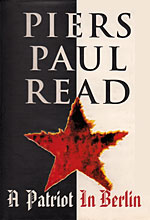Part one of this review is here
Part three of this review is here

A Patriot in Berlin has some of the archetypal features of books set shortly after the fall of the Soviet Union. To the fore is the presence of those ex-KGB and military types deeply concerned at the loss of Soviet power, and with it their own power. The list of novels built on similar concerns in the 1990s is long (immediately springing to mind are Tim Sebastian’s Saviours Gate, and Tony Cape’s The Last Defector).
Having elements of a formula does not make a novel formulaic, nor does dealing with common themes make it derivative. A Patriot in Berlin has striking elements of its own. It is set in post-unification Berlin in 1992-93 and is based around plans for an exhibition of Russian art forbidden in the Soviet years.
Read has a gift for encapsulating the uncertainty of these years; an uncertainty which Russia in Fiction remembers well from life in Moscow during that period.
Continue reading